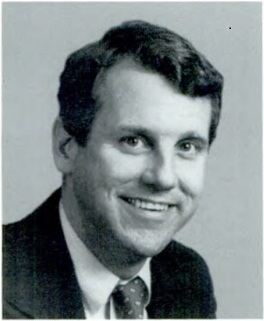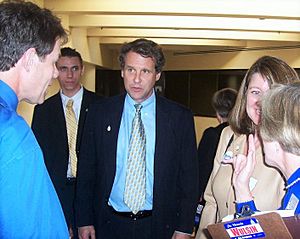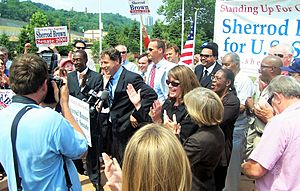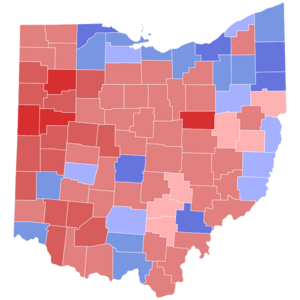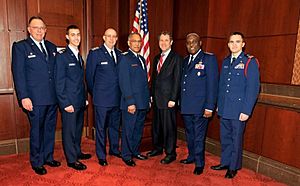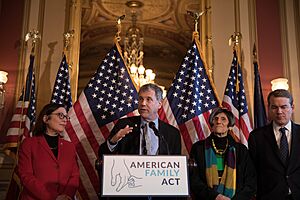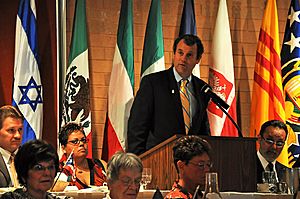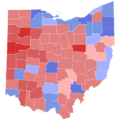Sherrod Brown facts for kids
Quick facts for kids
Sherrod Brown
|
|||||||||||||||||||||
|---|---|---|---|---|---|---|---|---|---|---|---|---|---|---|---|---|---|---|---|---|---|
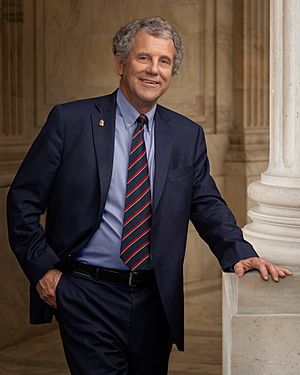
Official portrait, 2021
|
|||||||||||||||||||||
| United States Senator from Ohio |
|||||||||||||||||||||
| In office January 3, 2007 – January 3, 2025 |
|||||||||||||||||||||
| Preceded by | Mike DeWine | ||||||||||||||||||||
| Succeeded by | Bernie Moreno | ||||||||||||||||||||
|
|||||||||||||||||||||
| Member of the U.S. House of Representatives from Ohio's 13th district |
|||||||||||||||||||||
| In office January 3, 1993 – January 3, 2007 |
|||||||||||||||||||||
| Preceded by | Don Pease | ||||||||||||||||||||
| Succeeded by | Betty Sutton | ||||||||||||||||||||
| 46th Secretary of State of Ohio | |||||||||||||||||||||
| In office January 12, 1983 – January 14, 1991 |
|||||||||||||||||||||
| Governor | Dick Celeste | ||||||||||||||||||||
| Preceded by | Anthony J. Celebrezze Jr. | ||||||||||||||||||||
| Succeeded by | Bob Taft | ||||||||||||||||||||
| Member of the Ohio House of Representatives from the 61st district |
|||||||||||||||||||||
| In office January 3, 1975 – January 3, 1983 |
|||||||||||||||||||||
| Preceded by | Joan Douglass | ||||||||||||||||||||
| Succeeded by | Frank Sawyer | ||||||||||||||||||||
| Personal details | |||||||||||||||||||||
| Born |
Sherrod Campbell Brown
November 9, 1952 Mansfield, Ohio, U.S. |
||||||||||||||||||||
| Political party | Democratic | ||||||||||||||||||||
| Spouses |
|
||||||||||||||||||||
| Children | 2 | ||||||||||||||||||||
| Relatives | Charlie Brown (brother) | ||||||||||||||||||||
| Education | Yale University (BA) Ohio State University (MA, MPA) |
||||||||||||||||||||
| Signature | |||||||||||||||||||||
Sherrod Campbell Brown (born November 9, 1952) is an American politician. He served as a U.S. Senator for Ohio from 2007 to 2025. He is a member of the Democratic Party. Before becoming a senator, he was a U.S. Representative for Ohio's 13th district from 1993 to 2007. He also served as the Secretary of State of Ohio from 1983 to 1991. Brown began his political journey in 1975 as a state representative. He is known in his party for his progressive and populist ideas.
Brown grew up in Mansfield, Ohio. He went to Yale University and Ohio State University. He was first elected to the U.S. Senate in 2006. He won against the Republican senator, Mike DeWine. Brown was reelected in 2012 and 2018. During his time in the Senate, he led the Committee on Banking, Housing, and Urban Affairs. He also served on committees for Finance, Veterans' Affairs, and Ethics. In 2024, he ran for reelection but lost to Bernie Moreno. He was the last Democrat to hold a statewide elected office in Ohio.
Contents
Early Life and Education
Sherrod Brown was born in Mansfield, Ohio, on November 9, 1952. His parents were Emily and Charles Gailey Brown. He has a mix of Scottish, Irish, German, and English family roots. His brother, Charlie Brown, was the Attorney General of West Virginia. Sherrod became an Eagle Scout in 1967. He finished Mansfield Senior High School in 1970.
In 1974, Brown earned a degree in Russian studies from Yale University. While at Yale, he supported George McGovern in the 1972 presidential election. He later earned two master's degrees from Ohio State University. He received a Master of Arts in education and a Master of Public Administration. He also taught at Ohio State University's Mansfield campus from 1979 to 1981.
Early Political Career
During his last year of college, Brown was asked to run for the Ohio House of Representatives. He served as a state representative in Ohio from 1974 to 1982. When he was first elected, he was the youngest person to join that group. In 1982, Brown ran for Ohio Secretary of State. He won the Democratic primary election. Then he defeated Republican Virgil Brown in the main election.
He was reelected as Secretary of State in 1986. As Secretary of State, Brown worked to help more people register to vote. In 1990, he lost his reelection bid to Bob Taft. Taft later became the governor of Ohio.
Serving in the U.S. House of Representatives
Joining the House in 1992
In 1992, Brown moved to Lorain, Ohio. He won a tough Democratic primary for an open seat in Ohio's 13th congressional district. This district was in the western and southern suburbs of Cleveland. He easily won the general election. He was reelected six times to this position.
Key Actions in the House
The Democratic Party lost its majority in the House in 1994. Brown remained in the minority for the rest of his time there. He worked to get more money to fight tuberculosis.
In 2005, Brown led the Democratic effort to stop the Central American Free Trade Agreement (CAFTA). He worked hard to get votes against it. The agreement passed by only one vote.
Brown was against a change to Ohio's constitution that would have banned same-sex marriage. He also voted against the Defense of Marriage Act in 1996. This law defined marriage as between a man and a woman.
House Committee Roles
Brown was a top minority member on the Health Subcommittee of the House Energy and Commerce Committee. He also served on subcommittees for Telecommunications and the Internet. He was also on the Subcommittee on Commerce, Trade and Consumer Protection. While on the House International Relations Committee, he was part of the Subcommittee on Asia and the Pacific.
Serving in the U.S. Senate
Senate Elections
2006 Election
In 2005, Brown first said he would not run for the U.S. Senate. The seat was held by Republican Mike DeWine. But in October, Brown changed his mind. Another Democrat, Paul Hackett, then left the race. This made it almost certain Brown would win the Democratic nomination. In the May primary, Brown won with over 78% of the vote.
On November 7, 2006, Brown defeated Mike DeWine. Brown won with 56.2% of the votes.
2012 Election
Brown ran for reelection in 2012. His opponent was Josh Mandel. Brown had a steady lead in early polls. Mandel won the Republican primary in March.
Brown faced a lot of opposition from outside groups. These groups spent millions of dollars on TV ads against him. On November 6, 2012, Brown kept his seat. He won with 50.7% of the vote.
2018 Election
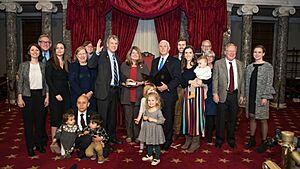
In 2018, Brown was reelected for his third Senate term. He defeated Republican U.S. Representative Jim Renacci. Brown won with 53.4% of the votes.
2024 Election
In 2024, Brown ran unopposed in the Democratic primary. In the general election, he faced Republican businessman Bernie Moreno. Brown lost the election by over 200,000 votes. He received 46.5% of the vote. Moreno's win helped the Republican Party gain a majority in the 119th United States Congress.
Time in the Senate
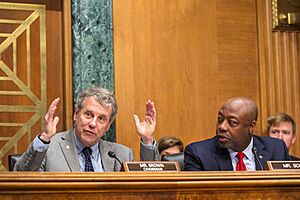
Brown is known for being critical of free trade. He has taken progressive stands on money issues. He has encouraged the Democratic Party to focus on issues that help working-class Americans. In 2018, he was named co-chair of a committee. This committee worked on the financial health of pension plans.
During the start of the COVID-19 pandemic, Brown suggested a bill. It would let workers get paid sick days right away. This would help them stay home if they were sick. He said this would slow the spread of the virus.
After President Donald Trump was impeached in December 2019, Brown voted to remove him from office. He supported having witnesses testify during the impeachment trial.
In 2020, Brown pushed for a law to make the EPA regulate certain chemicals more strictly.
In 2021, Brown urged Defense Secretary Lloyd Austin to create a special center in Ohio. This center would focus on advanced air mobility. In July 2024, he called for Joe Biden to withdraw from the 2024 United States presidential election.
Senate Committee Roles (118th Congress)
- Committee on Agriculture, Nutrition, and Forestry
- Subcommittee on Food and Nutrition, Specialty Crops, Organics, and Research
- Subcommittee on Livestock, Dairy, Poultry, Local Food Systems, and Food Safety and Security
- Committee on Banking, Housing, and Urban Affairs (chair)
- Committee on Finance
- Subcommittee on International Trade, Customs, and Global Competitiveness
- Subcommittee on Social Security, Pensions, and Family Policy (chair)
- Committee on Veterans' Affairs
Caucus Memberships
- Senate Taiwan Caucus
After the Senate
After losing the 2024 election, Sherrod Brown's term as Senator ended. He has returned to private life. In his farewell speech, he said he would stay involved in public life. He also mentioned that people would "hear from me" again. Brown had shown interest in running for governor of Ohio in 2026.
In January 2025, Harvard Kennedy School announced Brown would be a visiting fellow. In March 2025, he started the Dignity of Work Institute. Brown wrote articles in The New Republic and The New York Times. These articles discussed his views on the economy and the Democratic Party.
Considering National Campaigns

Brown was a close ally of Bernie Sanders in the Senate. However, he supported Hillary Clinton in the 2016 Democratic presidential primary. He campaigned for her in Ohio. He was considered as a possible vice-presidential running mate for Clinton. The choice came down to Brown and Tim Kaine. Kaine was chosen.
In 2017, Washington Monthly suggested Brown could be a presidential candidate in 2020. They thought he could unite different parts of the Democratic Party. Cleveland.com reported in 2018 that he was "seriously" thinking about running. After winning his third Senate term in 2018, he explored a presidential run in January 2019. In March, he announced he would not run for president. He decided to remain a senator.
Political Views
In 2011, Brown was ranked as one of the most liberal members of Congress. According to FiveThirtyEight, he voted with President Donald Trump's position about 25.8% of the time. During the 117th Congress, he voted with President Joe Biden's position 98% of the time.
In 2017, writer Michael Kazin called Brown "a politician ahead of his time." Brown told Kazin that many Ohioans feel looked down upon by people on the coasts. He blamed this idea on certain news outlets.
Education
Brown introduced a bill in 2015 called the Charter School Accountability Act. This bill did not become a law.
He praised teachers in West Virginia who went on strike in early 2018.
Energy and Environment
In 2012, Brown supported the Responsible Electronics Recycling Act. This bill would stop the export of some electronics for environmental reasons.
After the Flint water crisis, Brown planned to introduce a law. It would make the federal government step in when cities do not warn people about lead in drinking water. He also asked the federal government to give money to Ohio schools. This money would be for testing lead in drinking water.
Health Care
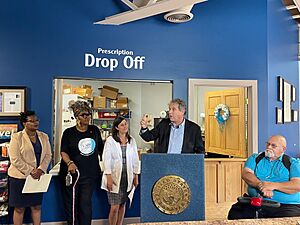
Brown supported the Patient Protection and Affordable Care Act. He voted for it in 2009 and 2010.
He also supported a plan that would let people aged 55 and older buy into Medicare.
Brown was one of six Democratic senators to introduce the American Miners Act of 2019. This bill aimed to help prevent the pension plan for miners from running out of money. It also increased a tax that helps miners with black lung disease.
Housing
In July 2023, Brown and other Democratic senators introduced the Stop Predatory Investing Act. This bill would stop large companies from getting tax breaks if they buy many single-family homes.
LGBT Rights
Brown voted against stopping same-sex couples from adopting children in Washington D.C. He received a high score from the Human Rights Campaign in 2005–2006. This showed his support for gay rights. He voted to end the "Don't Ask, Don't Tell" policy in 2010. This policy had prevented openly gay people from serving in the military.
In 2018, Brown signed a letter to the Secretary of State. It asked to reverse a policy that affected visas for same-sex partners of LGBTQ diplomats. In 2022, Brown voted for the Respect for Marriage Act. This law aimed to protect same-sex marriage rights across the country.
Veterans
Brown sponsored the Gold Star Fathers Act of 2014. This bill would give job preference to fathers of certain disabled or deceased veterans.
In 2015, Brown and Representative Tim Ryan introduced a law. It would give military veterans priority in signing up for college classes.
Banking and Finance
After the Panama Papers leak in 2016, Brown and Elizabeth Warren asked the Treasury Department to investigate. They wanted to see if U.S. citizens were avoiding taxes.
Brown became the chair of the Banking Subcommittee on Economic Policy in 2021. He started an investigation into a company called Archegos Capital. This company lost billions of dollars.
Campaign Finance
Brown has supported laws that would make political groups reveal their donors. When he thought about running for president in 2020, he promised not to take money from corporate political action committees. However, his Senate campaign later received corporate donations.
Taxes and Spending
Brown was against the 2017 tax bill. He argued that the bill mostly helped rich people and big companies. Vice President Mike Pence criticized Brown for his vote against the bill.
Brown voted for the American Recovery and Reinvestment Act of 2009. This act aimed to boost the economy.
Trade
Brown has often criticized free trade with China and other countries. In 2006, he argued that free trade harms the U.S. economy. He said it hurts workers when countries do not have strong labor rules.
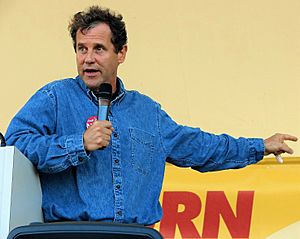
In his book Myths of Free Trade, Brown wrote that an unregulated global economy is a threat. He suggested measures like emergency tariffs and protecting "Buy America" laws. He also wanted foreign producers to meet American labor and environmental standards. Brown supported a bill that would officially call China a currency manipulator.
In 2016, Brown called for tariffs on imports from China. He also praised Hillary Clinton's plan to enforce trade laws.
Brown is against NAFTA. He believes it should be changed to help Ohio workers. He supported President Trump's decision in 2018 to put tariffs on washing machine imports. In 2019, he supported a new trade agreement for the U.S., Mexico, and Canada. He called it a "step toward a pro-worker trade policy."
In 2023, pressure from Brown and other Democrats led the Biden administration to change plans for a trade agreement in the Indo-Pacific.
Foreign Policy
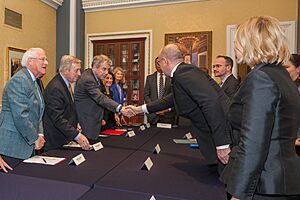
Brown was against the Iraq War. He voted against the resolution that allowed the war. He also voted against money for the war and for bringing U.S. troops home from Iraq.
In 2010, Brown voted for the New START treaty. This treaty aimed to reduce nuclear weapons between the U.S. and Russia.
Brown supported the Taiwan Relations Act. This act guides U.S. relations with Taiwan. He also helped introduce the Hong Kong Human Rights and Democracy Act. This act aimed to support democratic development in Hong Kong.
In 2015, Brown supported an amendment to the budget. It would put sanctions on Iran if it violated nuclear agreements.
In 2016, Brown signed a letter urging President Obama to veto resolutions against Israel. In 2017, he criticized U.S. support for Saudi Arabia's military actions in Yemen. He said Saudi Arabia was targeting civilians. He also voted for the Countering America's Adversaries Through Sanctions Act. This act placed sanctions on Iran, Russia, and North Korea.
In 2018, Brown and other senators urged Trump not to leave the Iran nuclear deal. He also called for sanctions against Chinese officials for human rights abuses against the Uyghur Muslim minority.
In 2019, after Juan Guaidó was declared interim president of Venezuela, Brown said the U.S. should use diplomacy. He called suggestions of military action "reckless."
In 2024, Brown urged the Biden administration to recognize a "nonmilitarized" Palestinian state after the Gaza war.
Gun Policy
Brown has criticized the political influence of gun manufacturers.
He called the Republican lawmakers in Ohio "lunatics" for a bill. This bill would allow people to carry guns in places like airplane terminals and police buildings.
Brown joined a filibuster for gun control. He also voted for an amendment that would stop people on the terrorist watch list from buying guns.
Railroad Safety
In 2019, Brown was one of ten senators to support the Safe Freight Act. This bill would require freight trains to have a certified conductor and engineer. This is to improve safety for trains and people living near tracks.
Terrorism
Brown was one of 67 members of Congress who voted against the 2001 USA PATRIOT Act. In 2015, he supported a bill to limit ISIS's funding. This bill would put sanctions on financial institutions that help ISIS. It also called for stricter passport rules and screening for people entering the U.S.
Personal Life
Brown was married to Larke Recchie from 1979 to 1987. They had two children. Years later, Recchie supported Brown in his campaigns.
In 2004, Brown married Connie Schultz. She is a Pulitzer Prize-winning columnist. She resigned from her job in 2011 due to a conflict of interest. She wrote books about her experiences as a politician's spouse. Brown has two stepchildren from this marriage.
Brown's daughter, Elizabeth, served on the Columbus City Council for seven years. He has five grandchildren. He is Lutheran. His brother, Charlie, was a former Attorney General of West Virginia.
In 2007, Brown received an honorary doctorate from Capital University. He also received an honorary degree from Otterbein University in 2014.
In June 2023, NBC News reported that Brown had been late paying his Cleveland property tax bill several times. He also claimed tax credits on properties in two different counties. Brown later paid the overdue taxes and repaid the tax credit. In August 2023, Brown corrected his Senate financial forms. These forms had not included his wife's pension money.
Images for kids
-
Brown being sworn into the Senate by Vice President Mike Pence in 2019 while surrounded by his family
-
Brown chairing the Committee on Banking, Housing, and Urban Affairs in 2024
-
Brown speaks at the 2016 Democratic National Convention
-
Brown speaks at 2008 Labor Day Festival
-
Brown meets with Ukrainian Prime Minister Denys Shmyhal in 2024
See also
 In Spanish: Sherrod Brown para niños
In Spanish: Sherrod Brown para niños
- List of United States senators from Ohio
- Ohio United States Senate elections
 | Frances Mary Albrier |
 | Whitney Young |
 | Muhammad Ali |


